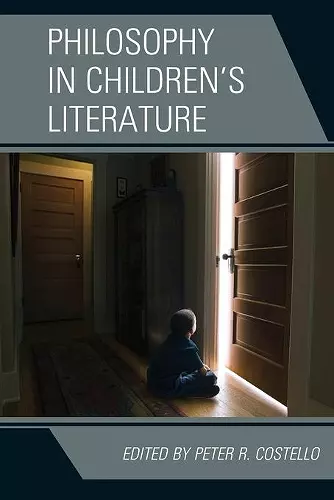Philosophy in Children's Literature
Format:Paperback
Publisher:Lexington Books
Published:15th Jun '13
Currently unavailable, and unfortunately no date known when it will be back

This book allows philosophers, literary theorists, and education specialists to come together to offer a series of readings on works of children’s literature. Each of their readings is focused on pairing a particular, popular picture book or a chapter book with philosophical texts or themes. The book has three sections—the first, on picturebooks; the second, on chapter books; and the third, on two sets of paired readings of two very popular picturebooks. By means of its three sections, the book sets forth as its goal to show how philosophy can be helpful in reappraising books aimed at children from early childhood on. Particularly in the third section, the book emphasizes how philosophy can help to multiply the type of interpretative stances that are possible when readers listen again to what they thought they knew so well. The kinds of questions this book raises are the following: How are children’s books already anticipating or articulating philosophical problems and discussions? How does children’s literature work by means of philosophical puzzles or language games? What do children’s books reveal about the existential situation the child reader faces? In posing and answering these kinds of questions, the readings within the book thus intersect with recent, developing scholarship in children’s literature studies as well as in the psychology and philosophy of childhood.
Editor Costello (Providence College) brings together an excellent sequence of examinations of the philosophical ideas in various children's literature. The text is split into unequal thirds that discuss picture books (nine chapters), chapter books (five chapters), and multiple readings/interpretations of the same text (four chapters, two per text). The contributors are primarily philosophers, but Costello's introduction situates the book both within the context of the philosophy and children movement and within scholarly interest in children's literature. In many ways, this volume owes less to the tradition of Matthew Lipman and Gareth Matthews than to the field of literary criticism. Thus, readers gain insight into reading and using these texts, but the texts remain objects to be examined by scholars--not readings to be shared with children. The chapters on Shel Silverstein's Missing Piece books and The Giving Tree are among the most engaging. The chapter on Robert C. O'Brien's Mrs. Frisby and the Rats of NIMH, written by his daughter, Sarah O'Brien Conly, follows closely behind. This is a valuable resource for those who do philosophy with children, scholars of children's literature, and educators looking for innovative readings of standard children's literature. Summing Up: Highly recommended. * CHOICE *
As we read children’s literature to our children, we always knew that the writers of many of these little books were engaged in philosophizing. Now a wonderful, focused, and informed study of particular children’s books explores the philosophical thinking and theorizing that is taking place in these writings. With continental philosophy in the background, the philosophical world of these books is opened up for those who want to find more out of what we read to our children and grandchildren, and what they read to themselves. The philosophical and moral language of these short works of fiction is taken seriously through philosophical essays by multiple contributors. Peter Costello’s introduction situates this enterprise in terms of contemporary continental thinking about the meaning of an engagement with human, personal, social, and moral issues with the caveat that such works must not be used for propaganda or to diminish human freedom and experience, but rather as an opening up of the child’s imagination, perception and thought. -- Hugh J. Silverman, Executive Director, The International Association for Philosophy and Literature, and Professor of Philosophy and Comparative Literary and Cultural Studies at Stony Brook University
Philosophy in Children's Literature is a nostalgic revisit of childhood favorites combined with a readable, introspective examination of the relationship between children's literature and philosophy. This book supports the premise that children are, by nature, philosophers, and that philosophy has meaning for humans of all ages. -- Debra Dew, Rockford College
Children's literature is an especially important part of culture, because of the formative role it plays in shaping the souls of future adults. This volume opens up the field of children's literature by way of allowing philosophy, and philosophers, to mark out new paths of understanding through many of our culture's familiar children's stories. By bringing together an international and interdisciplinary group of scholars, many of whom are directly connected to the production or criticism of children's literature, Costello invites us to re-connect to texts we thought we knew and to see them in a new, provocative light. This book should be of interest to any educated reader but will be of particular use in college courses on literature, philosophy, literary theory, and education. -- John Russon, University of Guelph
What do Kant, Wittgenstein, Heidegger, Derrida, and Badiou have to do with books like The Velveteen Rabbit, Where the Wild Things Are, and Pollyanna? This book’s exploration of the intriguing conjunction of philosophy and children’s literature has much to tell us not only about the relevance of ethical, ecological, feminist, existentialist (and many other) issues to children’s books, but also about the way children already have philosophical lives. In a series of sustained readings of short fiction for children, from picture books for the very young to books with chapters for adolescents, this volume takes a radical theoretical approach which yields many original insights. -- Ruth Parkin-Gounelas, Aristotle University of Thessaloniki, Greece
Is philosophical thinking relevant to children’s literature? The very presence and details of each individual essay would be a resounding yes These essays are written very accessibly, for an audience who is unfamiliar with academic philosophy and they are written with a conviction that shows the real value in focusing on children’s literature with a philosophical lens. * Metapsychology Online *
ISBN: 9780739184424
Dimensions: 240mm x 164mm x 30mm
Weight: 685g
354 pages